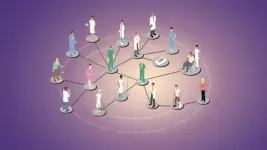(Press-News.org) The food system is one of the most significant sources of greenhouse gas emissions on the planet, making the reduction of emissions in this sector a priority for policymakers around the world. IIASA researchers explored the potential of carbon sequestration on farmland to combat climate change, offering insights into economic effects as well as its climate change mitigation potential.
Carbon sequestration on agricultural land refers to the process of capturing and storing carbon dioxide (CO2) from the atmosphere in soil and plants on farms. According to the authors of a new IIASA study just published in Nature Food, these practices hold great potential for reducing global warming while reducing economy wide mitigation costs.
“We set out to assess novel carbon sequestration options on agricultural land and their dynamics in an economic model. To date, these options were only assessed in bottom-up engineering studies and hence not considered in Integrated Assessment Model-based climate stabilization pathways that underpin the forward-looking chapters of the reports of the Intergovernmental Panel on Climate Change (IPCC),” explains lead author Stefan Frank, a senior researcher in the Integrated Biosphere Futures Research Group of the IIASA Biodiversity and Natural Resources Program. “Given the interlinkages across mitigation options, economic sectors, and world regions, integrated economic assessments like ours can provide valuable insights on the system-wide effects of these options.”
To help absorb carbon dioxide from the air and store it in the soil or in plants on their farms, farmers can, for example, use techniques like planting cover crops, using biochar (a type of charcoal made from organic waste), or practicing agroforestry (planting trees alongside crops or pastures), thereby turning their agricultural land into a carbon sink.
But why does this matter? The study results indicate that by 2050, these agricultural practices could reduce as much greenhouse gas emissions as planting new forests, particularly in regions like sub-Saharan Africa and South America. Carbon sequestration on agricultural land is not only important for climate change mitigation efforts but can also enhance agricultural productivity and resilience to climate change, and could help the agriculture, forestry, and land use sectors achieve net zero emissions globally by 2050 at costs between US$80 and $120 per ton of CO2 equivalent.
”These efforts would not only cut overall economy-wide emission reduction costs when compared to a 1.5°C scenario without agricultural carbon sequestration practices, but also reduce losses of global economic output by 0.6% by mid-century under a climate stabilization scenario aiming to limit warming to 1.5°C,” notes study coauthor Andrey Lessa Derci Augustynczik, a researcher associated with the same program at IIASA. “In addition, farmers could earn substantial income from these activities – up to $235 billion by 2050 – if they receive financial incentives for every additional ton of CO2 stored in soils and biomass at a projected greenhouse gas price of $160 per ton of CO2 equivalent in 2050.”
The authors highlight that implementing these changes will require strong institutions and monitoring of systems globally to ensure that farmers adopt these practices correctly and are paid fairly for their efforts.
“Despite the large mitigation potential at rather low cost, agricultural carbon sequestration potentials are mainly located in the Global South, which warrants caution as several structural, institutional, or social barriers exist. To unlock these potentials and provide meaningful contributions to ambitious climate stabilization efforts, highly efficient institutions and monitoring systems must be deployed in the short-term and the necessary policy incentives need to be put in place fast,” Frank concludes.
Reference
Frank, S., Lessa Derci Augustynczik, A., Havlík, P., Boere, E., Ermolieva, T., Fricko, O., Di Fulvio, F., Gusti, M., Krisztin, T., Lauri, P., Palazzo, A., Wögerer, M. (2024). Enhancing Agricultural Carbon Sinks Provides Benefits for Farmers and Climate. Nature Food DOI: 10.1038/s43016-024-01039-1
Further information
Read the accompanying research briefing here.
About IIASA:
The International Institute for Applied Systems Analysis (IIASA) is an international scientific institute that conducts research into the critical issues of global environmental, economic, technological, and social change that we face in the twenty-first century. Our findings provide valuable options to policymakers to shape the future of our changing world. IIASA is independent and funded by prestigious research funding agencies in Africa, the Americas, Asia, and Europe. www.iiasa.ac.at
END
Transforming agriculture from carbon source to sink
2024-09-23
ELSE PRESS RELEASES FROM THIS DATE:
City of Hope research spotlight, September 2024
2024-09-23
City of Hope® Research Spotlight features the latest research defining the future of medical treatment. This first roundup highlights a T cell engager that shows promise as a novel treatment for acute myeloid leukemia, findings linking immune aging to thymic involution and a potential way of eliminating myeloma with weak antigen expression.
To learn more about research at City of Hope, visit the Research & Innovation page.
IL1RAP-Specific T Cell Engager Depletes Acute Myeloid Leukemia Stem Cells
The novel anti-IL1RAP/CD3 T cell engager (TCE) BIF002 effectively targets and eliminates leukemic stem cells ...
20-week ultrasound in pregnancy is a key driver of disparities in prenatal diagnosis of congenital heart defects
2024-09-23
Patients insured by Medicaid are less likely to get prenatal diagnosis of heart defects than those with private insurance, and this disparity can be partly attributed to lower rates of 20-week ultrasound in pregnant people with public insurance, according to a study led by Ann & Robert H. Lurie Children’s Hospital of Chicago in collaboration with Advocate Christ Children’s Hospital. The study was published in the journal Prenatal Diagnosis.
“The 20-week ultrasound is hugely important in detecting birth defects because it involves assessment of the baby’s major organs. All pregnant people must know that ...
Educators and parents reveal culture of fear, censorship, and loss of learning opportunities in the wake of Florida policies
2024-09-23
How can a teacher discuss Jim Crow laws without breaking state law? Should a librarian stop ordering books with LGBTQ+ characters? A new white paper by UC San Diego and NYU researchers reveals the experiences of K-12 educators and parents in Florida grappling with state policies and policy effects restricting access to instruction, books, courses, clubs, professional development, and basic student supports.
Since 2021, Florida has enacted a series of state laws and policies restricting instruction related to race, ...
Energy inefficiency and inability to downsize pose even bigger threat to low-income pensioners than loss of Winter Fuel Payments, Cambridge study suggests
2024-09-23
The UK Government’s policy to scrap Winter Fuel Payments could disproportionately affect low-income pensioners in England, new analysis suggests. But the same study argues that the energy inefficiency of homes and challenges involved in downsizing will have an even more harmful effect this winter.
The study, published in Energy Research and Social Science, was completed shortly before the Winter Fuel Payment vote was taken, by researchers from the University of Cambridge and Delft University of Technology (TU Delft).
The researchers raise particular concerns about the impact of the policy on pensioners with annual incomes of between ...
Innovative model provides valuable insights into prostate cancer spread
2024-09-23
A new preclinical model using CRISPR, an advanced technology that allows scientists to cut and edit genes, has given Weill Cornell Medicine researchers and their colleagues a deeper insight into how prostate cancer spreads or metastasizes.
In the study, published Sept. 23 in Cancer Discovery, scientists charted the complicated routes prostate cancer metastatic cells take as they travel through the body.
“Using virtual maps, we can reveal the hidden highways of metastases, one day guiding us towards novel therapies that could act as roadblocks for cancer,” ...
NIH awards $27M to establish new network of genomics-enabled learning health systems
2024-09-23
The National Institutes of Health (NIH) is awarding $5.4 million in first-year funding to establish a new program that supports the integration of genomics into learning health systems.
Present in many hospitals across the United States, learning health systems are a type of clinical practice that bridges research and patient care. These systems use a variety of methods to continually analyze patient data. Clinicians then use the results of those analyses to refine practices and improve future care.
The new Genomics-enabled Learning Health System (gLHS) Network aims ...
People prefer to work with higher-paid colleagues
2024-09-23
When given the choice, people prefer to collaborate on work projects with higher-paid colleagues, but they want to hire subordinates with a lower pay history than theirs, according to research published by the American Psychological Association.
The research, published in the journal American Psychologist, aimed to explore how a trend toward increasing pay transparency in the business world may affect workers’ behavior.
“I've long been interested in the ways in which slight -- and not-so-slight -- differences in salaries can generate strong ...
Deeper corals may help shallow reefs recover in the Florida keys
2024-09-23
Since the 1970s, coral reefs in the Florida Keys National Marine Sanctuary (FKNMS) have experienced catastrophic declines in coral cover, with as much as a 50% reduction between 1998 and 2011 alone. Although coral reefs within the FKNMS have been heavily studied, research in the mesophotic zone, which extends from about 100 to 500 feet deep, has historically been more limited in this region.
Mesophotic coral ecosystems have the potential to be buffered from anthropogenic stressors due to their depth and/or relative isolation from ...
Why saying you’ll ‘never retire’ may be a warning sign
2024-09-23
COLUMBUS, Ohio – Americans who say they expect to “never retire” are more likely than others to score low on a measure of financial knowledge, a new study shows.
In a national survey, 20% of those who missed all three financial knowledge questions said they expected they would never retire, compared to 12% who answered all questions correctly, who said they’d likely work well past retirement age.
The study also found that those who were overconfident in their financial knowledge (and those whose low levels of confidence ...
Study reveals high rates of seafood mislabeling and ambiguous market names in Calgary, Alberta, highlighting species of conservation concern
2024-09-23
A new peer-reviewed study published in PeerJ Life and Environment has uncovered alarming levels of seafood mislabeling and the use of ambiguous market names in Calgary's seafood market, often concealing species of conservation concern. This research marks the first Canadian study to investigate both invertebrate and finfish mislabeling and the implications of unclear market names.
The study, titled "Mislabeled and Ambiguous Market Names in Invertebrate and Finfish Seafood Conceal Species of Conservation ...



